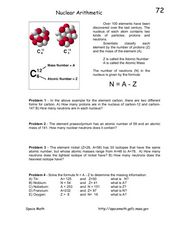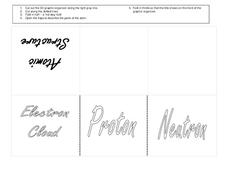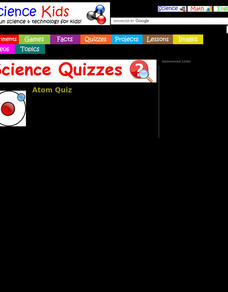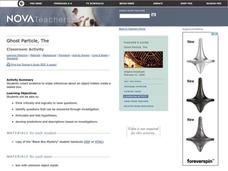Curated OER
Atomic Musical Chairs
An engaging activity enlightens young chemists in this instructional activity on atomic structure. They play musical chairs through a series of concentric circles that represent electon orbitals. A laundry basket in the middle holds the...
Curated OER
The Atoms Family ~ Atomic Math Challenge
Bold boxes present parts of the periodic table, with some of the contents conveniently missing. Beginning chemists fill in the blanks, which may include the atomic number, atomic mass, atomic symbol, or element name. Beneath each box...
Curated OER
The Number of Neutrons
Although the focus of this worksheet is the neutron, you cannot talke about them without also dealing with protons and electrons! Chemistry kids fill in a table of 14 elements, identifying the mass, atomic number, isotopic symbol, and...
Curated OER
The Atom Board - Making Atoms
In this atom worksheet, chemists learn how to determine the number of protons, neutrons and electrons in an atom using the atomic mass and atomic number. They complete a chart of the subatomic particles and use marbles to represent...
Curated OER
Nuclear Arithmetic
In "Nuclear Arthmetic," first-time physical scientists examine atomic structure and the periodic table of elements. The are given the formula, "N = A-Z," in which N is the number of neutrons, A is the atomic mass, and Z is the atomic...
Curated OER
All About Circuits ~ Atomic Structure
In this interactive Internet assignment, physical science investigators answer 11 questions about the atom, the subatomic particles, and atomic structure. They can click on "Reveal Answer" to discover if they are correct. They also...
Curated OER
Atomic Structure and Ionic Bonding (A Visual Approach)
Using toothpicks, marshmallows, and round colored sticky dots, physical science enthusiasts build models of an atomic nucleus. In this eighth grade chemistry lesson plan, they play an atom-naming game with the models that they have...
Curated OER
Atoms and Elements: An Introduction
Students are able to discuss the difference between a proton, a neutron and an electron. They also can explain the difference between an ionic and a covalent bond. Students know the main structure of atoms and molecules. Student are able...
Curated OER
Distinguishing Between Atoms
Every type of question is used to query young chemists about atomic structure. A vocabulary list tops the page before fill in the blanks, true/false, and matching questions are listed. This is a neatly formatted and pertinent worksheet...
Curated OER
Chemistry: Atomic Number and Mass Number
All you will find here is a simplistic chart of 17 elements (hydrogen is repeated) for chemistry beginners to fill in. They list atomic number, mass, and the numbers of protons and electrons. There are three critical thinking questions...
Curated OER
Protons, Neutrons and Electrons Homework
Perfect for reviewing atomic components, this worksheet simply consists of a large, easy-to-read chart of 11 elements. Chemistry learners fill in the missing element symbol, number of protons, neutrons, and electrons, the atomic mass and...
Curated OER
Protons, Neutrons, and Electrons
Using the periodic table of elements, young chemists fill in a chart of isotopes to show the atomic number, mass, charge, number of protons, number of neutrons, and number of electrons. The chart is followed by 11 questions that...
Curated OER
The Atom
In this atom worksheet, students complete a graphic organizer for the structure of the atom. They include the definition of the mass number, the atomic mass, the atomic number, the protons, neutron and electrons.
Curated OER
The Atom
In this atom worksheet, students complete a 3 D graphic organizer for the structure of the atom. They define atomic structure, electron cloud, proton and neutron. They cut out the terms to make flaps with definitions.
Curated OER
Atomic Structure and Bonding
Eighth graders discuss and write about what led up to the discovery of the atom. Students label proton, nucleus, electron, and neutron in their notes. Students take notes on electron shells and how different atoms have different...
Curated OER
Teaching Atomic Structure Using Cooperative Learning
Individuals in a group of four each take on a different role: atomic number expert, mass number expert, isotope expert, and nuclear atom expert. They teach each other about their area of expertise. As an assessment, a short quiz is...
Curated OER
Science: Atom Quiz
In this science: atom quiz worksheet, learners answer 10 true or false questions, not interactively, then scroll down to check their answers.
Curated OER
Elements
In this elements worksheet, students match the 12 terms with the appropriate definition. Students review vocabulary such as proton, electron, atomic number, and atomic mass.
Curated OER
Atoms and Their Interactions
In this atoms worksheet, learners will review the characteristics of elements, atoms, and isotopes. Then students will compare the difference between ionic and covalent bonds. Finally, learners will balance a chemical equation. This...
Curated OER
Element Trading Cards
In this chemistry worksheet, students use the Internet to research the elements in the Periodic Table to locate the number of proton, neutrons, and electrons. They also draw pictures that illustrate one or more uses for their elements.
Curated OER
GED Chemistry Vocab Word Search
In this chemistry worksheet, students locate and identify various vocabulary terms related to chemistry. There are 18 words/phrases located in the puzzle.
Curated OER
The Ghost Particle
Learners collect evidence to make inferences about a object hidden inside a sealed box. They think critically and logically to raise questions. Students identify questions that can be answered through investigation. They formulate and...
Curated OER
Atom and Eve
Students research and define an atom using a concept map. They design and create a model of an atom, labelling all the parts, and write a journal entry.
Curated OER
Physical Science Project-Atom
Fifth graders investigate atoms. In this atom lesson, 5th graders investigate the parts of an atom. Students explore atom numbers and determine the number of electrons is in each atom.

























